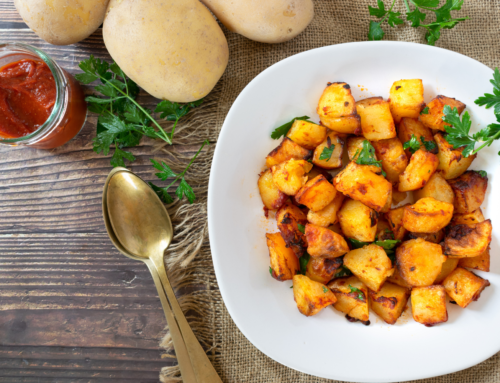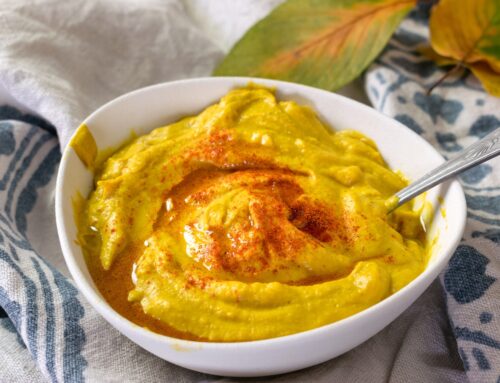Spring Cleanse: Mediterranean Style
By Christine Kenneally
Updated March 20, 2018
This winter sure took a toll on me! Long months of frigid weather kept me indoors much more than I would have liked. I turned to comfort foods for nourishment- hot stews, more meat than usual and starchy vegetables. Stagnancy set in a bit. Just when I was beginning to think it would never end, Mother Nature reassured me of the cycle of the seasons by melting the snow and giving new life a chance to grow. I cried happy tears when I raked the leaves out of my garden beds and saw the first green shoots poking up: the crocuses, lilies, and hostas. The lemon balm and St Johns wort were also alive and well. It seems impossible that plants can be so hearty.
I tend toward frenzied energy in the spring. It’s a very intense time of change, growth, and new birth. So much is going on as I come out of hibernation and make up for lost time. I’m tempted to work longer hours and at a faster pace because I have more energy. But this can be stressful. My winter was spent in an introspective way, cultivating creative ideas. In the spring, the first thing I want to do is, well, everything I’ve been thinking about and planning! And with that comes feeling overwhelmed and stress.
For the first time last year, I noticed how much more at peace I felt when I tuned in to nature throughout changing seasons. Getting in the flow of what is going on in the natural world is healthy, both physically and emotionally.
Noticing the slow and steady way that the plants embrace the season can be a reminder that we don’t need to do everything at once. The trees get their buds slowly, and they open up gradually. Every day, things look just a little bit greener. Bees are another reminder- they work with steady focus. At first glance, they seem busy and chaotic, but if you really take the time to watch, you’ll notice that there is a very soothing and repetitive rhythm to their movements and buzzing, and it is very grounding and harmonious. If we take a lesson from this and focus on the big picture in a slow and steady way, we can soothe the frenetic feelings that can creep in during this time. Better yet, if we spend time really watching the unfolding of new life with awe and wonder, we will match this with our own energy. At least that is what last year was like for me.
It’s important to pay attention to the first wild plants that spring up. They come to us now for a reason. That heavy stagnant feeling that builds up over the winter is a result of our liver, kidneys and gall bladder being exhausted from processing all of the heavy foods we’ve been eating. This is when they need support. Nature gives us the exact plants to do that: wild mustard greens, dandelion, chickweed, plantain, violet, chicory, and garlic mustard, just to name a few. The common flavors these plants share is bitter and pungent, which for many of us, takes some getting used to because it has been essentially erased from the American diet. Bitter is important for our digestive health as just the taste of bitterness on our tongue produces enzymes that stimulate digestion. Our bodies are waking up from a long slumber and this bitter flavor gives us a jumpstart to get things moving. We also need to flush away waste and toxins, and these plants help us do that by acting as diuretics.
Many cuisines around the world hold bitter greens in high regard. They are a staple of the Mediterranean diet, eaten at almost every meal. In many cases, they are foraged from fields where they grow wild. The type of wild greens eaten varies greatly according to season and climate, but that fresh, bitter flavor is ever present. These greens can be added to salads and eaten raw, or sautéed with olive oil and other herbs and spices. Adding meat and/or potatoes to the dish makes for a hearty and delicious meal. If you typically don’t like the taste of bitter foods, you may want to start off slowly, adding a smaller amount of bitter greens to a milder green like spinach or chard. Cooking greens with olive oil and spices makes them taste less bitter, just be careful not to mask the bitterness with sweeteners or you will not get the full digestive benefit.
Mustard greens, which are a member of the brassica family, can be found growing wild in most parts of the world, usually in fields and along the side of the road. They can also be purchased at the grocery store, for those with less time to wander around the fields! If you decide to forage, here is a good source of information on safe and ethical wildcrafting.
In addition to supporting digestion and elimination, these bitter greens are packed with nutrients and vitamins. They are particularly high in vitamins A and C, which are associated with a lowered risk of certain types of cancer, heart disease and infection. They can be eaten raw or cooked, but cooking them decreases the vitamin C to some degree.
Celebrate spring by enjoying its wild bounty. Try our recipe for Super Spring Detox Salad, which showcases the bitter flavor of the greens yet the bitter is mellowed by the addition of beans and feta cheese.
Wishing you a spring filled with wonder and awe, new beginnings and a steady grounded rhythm to your days!












Winter LeBlanc says:
Winter LeBlanc says:
Bill Bradley, R.D. says: